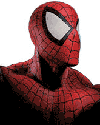Spiderman boigraphy
@ajayathmajan2 (8)
India
2 responses
@rogue13xmen13 (14402)
• United States
7 Apr 10
Okay, first let's fix a few things: It is Spider-Man! That hyphen in the name is very important. Also, go to to www.marvel.com or go to www.wikipedia.org and look up Spider-Man on both, and you will know who this character is.
I grew up on Spider-Man and I even met his creator more times than I can count. Also, I believe that this has been discussion has been posted before.
Next time, go for characters that are rarely mentioned. I am a comic snob, and I know comics very well, so if you are going to start a discussion on comic books, hit it where it hurts.
Most Marvel Comic fans cannot stand Joe Quesada and Avi Arad because they feel that these two men are going to be the downfall of the Marvel Comics. Bring up how Marvel Comics was bought out by Disney. What kind of major effect is this going to have on the comic company?
I am giving you ideas here. You can also talk about DC (which is Superman, Batman, Green Lantern, Green Arrow, and anyone from the Justice League), you can talk about Dark Horse (which is Hellboy and Umbrella Academy) or you can talk about Image Comics (which I believe is Youngbloods and I think Wildcats).
Or, if you are going to talk about Spider-Man, talk about his former marriage to Mary Jane Watson (they are no longer married), talk about his love affair with Black Cat, talk about the welfare of his Aunt May, talk about current villains who destroying his life, or talk about his relationship with the character Ezekiel. There are so many things that you can bring up with this character. The possibilities are endless.







